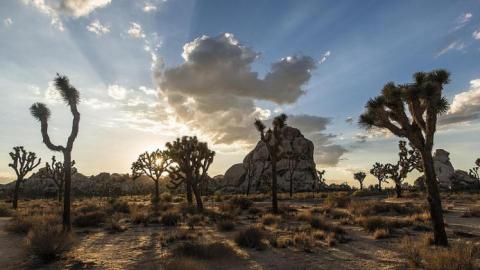
It's a charismatic, distinctive symbol of the California deserts -- and it's in trouble. The Joshua tree, the iconic denizen of the Mojave Desert, faces serious threats from climate change, drought, and human development.
And a group of scientists wants to see if the tree's genome holds potential answers to those threats. The Joshua Tree Genome Project aims to complete the first genome of an individual Joshua tree. That first genome will be used as a baseline with which to compare other Joshua trees, so that scientists can get a sense of the true genetic diversity of the picturesque succulent tree.
Among the questions the project's biologists hope the trees' genetic makeup will help to answer are what drives the plants' reliance on yucca moths for pollination, and whether the wild population of trees might hold traits that allow survival in a warmer, drier, world.
Joshua trees, known to botanists as Yucca brevifolia, are found only in the Mojave Desert and its fringes in California, Nevada, Arizona, and the southwest corner of Utah. They are generally thought to be a relict of cooler, wetter times in the desert. They grow only above 2,000 feet and usually higher, and without a significant stretch of cool, moist winters and springs, the trees generally don't make it through the first few years after germination.

